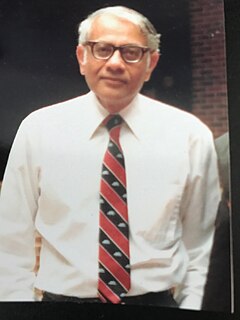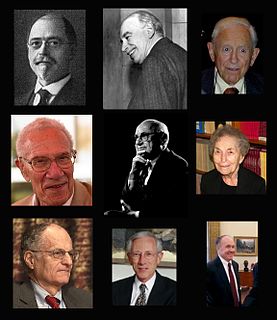In economics, economic equilibrium is a situation in which economic forces such as supply and demand are balanced and in the absence of external influences the (equilibrium) values of economic variables will not change. For example, in the standard textbook model of perfect competition, equilibrium occurs at the point at which quantity demanded and quantity supplied are equal. Market equilibrium in this case is a condition where a market price is established through competition such that the amount of goods or services sought by buyers is equal to the amount of goods or services produced by sellers. This price is often called the competitive price or market clearing price and will tend not to change unless demand or supply changes, and the quantity is called the "competitive quantity" or market clearing quantity. However, the concept of equilibrium in economics also applies to imperfectly competitive markets, where it takes the form of a Nash equilibrium.
In economics, effective demand (ED) in a market is the demand for a product or service which occurs when purchasers are constrained in a different market. It contrasts with notional demand, which is the demand that occurs when purchasers are not constrained in any other market. In the aggregated market for goods in general, demand, notional or effective, is referred to as aggregate demand. The concept of effective supply parallels the concept of effective demand. The concept of effective demand or supply becomes relevant when markets do not continuously maintain equilibrium prices.
In population genetics, linkage disequilibrium is the non-random association of alleles at different loci in a given population. Loci are said to be in linkage disequilibrium when the frequency of association of their different alleles is higher or lower than what would be expected if the loci were independent and associated randomly.
Robert Joseph Barro is an American macroeconomist and the Paul M. Warburg Professor of Economics at Harvard University. The Research Papers in Economics project ranked him as the fifth most influential economist in the world, as of March 2016, based on his academic contributions. Barro is considered one of the founders of new classical macroeconomics, along with Robert Lucas, Jr. and Thomas J. Sargent. He is currently a senior fellow at Stanford University's Hoover Institution and co-editor of the Quarterly Journal of Economics, the top journal in economics in terms of its impact factor.

Fritz Machlup was an Austrian-American economist who was president of the International Economic Association from 1971–1974. He was one of the first economists to examine knowledge as an economic resource, and is credited with popularizing the concept of the information society.
Monetary disequilibrium theory is a product of the monetarist school and is mainly represented in the works of Leland Yeager and Austrian macroeconomics. The basic concepts of monetary equilibrium and disequilibrium were, however, defined in terms of an individual's demand for cash balance by Mises (1912) in his Theory of Money and Credit.
Disequilibrium is the lack of or opposite of an equilibrium.

Gangadharrao Soundalyarao "G. S." Maddala was an Indian American economist, mathematician, and teacher, known for his contributions in the field of econometrics and for the textbooks he authored in this field.
Moses Abramovitz was a 20th-century American economist and professor. During his career, he made many contributions to the study of macroeconomic fluctuations and economic growth over time.
The Robertson Lag is an example of the systematic delay which the economy suffers from when conditions change and is named after the famous economist Dennis Robertson. This lag describes how a consumers change in income and wealth, a change in its consumption function, leads to a delayed change in its consumption.
In economics, an excess supply or economic surplus is a situation in which the quantity of a good or service supplied is more than the quantity demanded, and the price is above the equilibrium level determined by supply and demand. That is, the quantity of the product that producers wish to sell exceeds the quantity that potential buyers are willing to buy at the prevailing price. It is the opposite of an economic shortage.
Lundberg is a surname of Swedish origin. Lundberg means "wooded hill" or "mountain grove".

George Andrew Lundberg was an American sociologist.

Macroeconomic theory has its origins in the study of business cycles and monetary theory. In general, early theorists believed monetary factors could not affect real factors such as real output. John Maynard Keynes attacked some of these "classical" theories and produced a general theory that described the whole economy in terms of aggregates rather than individual, microeconomic parts. Attempting to explain unemployment and recessions, he noticed the tendency for people and businesses to hoard cash and avoid investment during a recession. He argued that this invalidated the assumptions of classical economists who thought that markets always clear, leaving no surplus of goods and no willing labor left idle.
In macroeconomic theory, general disequilibrium is a situation in which some or all of the aggregated markets, such as the money market, the goods market, and the labor market, fail to clear because of price rigidities. In the 1960s and 1970s, economists such as Edmond Malinvaud, Robert Barro and Herschel Grossman, Axel Leijonhufvud, Robert Clower, and Jean-Pascal Benassy investigated how economic policy would impact an economy where prices did not adjust quickly to changes in supply and demand. The most notable case occurs when some external factor causes high levels of unemployment in an economy, leading to households consuming less and firms providing less employment, leading to a rationing of both goods and work hours. Studies of general disequilibrium have been considered the "height of the neoclassical synthesis" and an immediate precursor to the new Keynesian economics that followed the decline of the synthesis.
Herschel Ivan Grossman was an American economist best known for his work on general disequilibrium with Robert Barro in the 1970s and later work on property rights and the emergence of the state.
Disequilibrium macroeconomics is a tradition of research centered on the role of disequilibrium in economics. This approach is also known as non-Walrasian theory, equilibrium with rationing, the non-market clearing approach, and non-tâtonnement theory. Early work in the area was done by Don Patinkin, Robert W. Clower, and Axel Leijonhufvud. Their work was formalized into general disequilibrium models, which were very influential in the 1970s. American economists had mostly abandoned these models by the late 1970s, but French economists continued work in the tradition and developed fixprice models.
Shelly J. Lundberg is an economist and currently holds the positions of Leonard Broom Professor of Demography at the University of California, Santa Barbara, where she serves as Associate Director of the Broom Center for Demography. Lundberg is one of the world's leading population economists.




